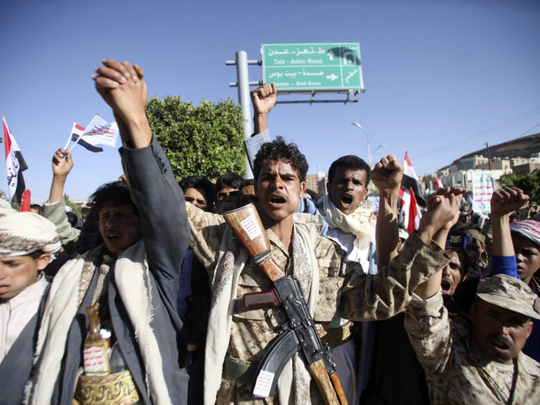
There can be no doubt that Iran’s current relationship with the Al Houthis who have placed themselves for the time being as rulers of Sana’a, is viewed with fear and mistrust. It would be an understatement to say Saudi Arabia, the Gulf states and the rest of the Middle East are worried that the relations with the Al Houthis testify to Iran’s political ambitions, which have already creeped into Iraq, Syria and Lebanon. Tehran is now turning to newer pastures and geographical terrain at the southern tip of the Arabian peninsula, and may just move upwards as feared by many.
What is more worrying is that Iran is making no secret of its joy at expanding its sphere of influence into Yemen, and hooking up with newly installed political leaders in Sana’a. In fact, the Al Houthis and Iran just signed a 14-flight-a-week deal between Sana’a and Tehran to emphasise a growing relationship. Despite the ramifications and political fluidity in Yemen and the tenuous situation — President Abd Rabbo Mansour Hadi escaped house arrest and is now making a comeback from Aden — Iran is glad about the new political developments and the apparent Al Houthi ascendancy. Through its politicians and policymakers, Iranians are not mincing words about what they see as the latest prize with many arguing the country is on the verge of exporting its Islamic revolution to Yemen, and from there to other places.
But isn’t this a little bit too much to say, and lacking in realism? Well, this of course depends on your point of view and the kind of perspective you hold. It could be the train of thought of analysts who might say Iran now has the ability with the help of the Al Houthis to clear the Yemeni decks, long embroiled in conflict and unable to make up their minds on how the country wants to be ruled, and turn the political tables around.
This would involve squeezing Hadi, and sending him into the political wilderness, getting rid of the established political order and establishing a viable state. Iran would then have the chance of pulling the strings from behind the scenes with the Al Houthis as sort of puppets.
However, all this might only be in the realm of theory, as on the ground, Zaidi Shiites such as the Al Houthis account for only about a third of the 25 million Yemeni population; they are a minority among a warring tribal complex based on clan and kinship.
There are rumours their ascendance to power in Sana’a was facilitated by former president Ali Abdullah Saleh. He is sore at having relinquished his 33-year-old presidency in favour of his deputy, Hadi, under Saudi pressure. Riyadh didn’t want to rock the political order too much, but felt a change was called for. It is argued that he still has enough influence in the army and assembly and among his General People’s Congress party to get his own by siding with the Al Houthis and Iran if need be.
All that could be fanciful thinking. The truth of the matter is that although Iran is playing an active regional role, it’s already over-stretching its budget through its adventures in other countries such as Afghanistan, Pakistan and Turkmenistan, in addition of course to Iraq, Syria and Lebanon.
And with the addition of the Al Houthis in Sana’a that would surely be stretching itself to the breaking point, especially in light of falling oil prices — from $115 a barrel in June to the current fluctuating price of about $60. Be that as it may, Iran might still be a sucker for an opportunity and continue to be thrilled about backing the new Al Houthi horse. Whilst they may not yet be providing a great deal of money to the group, they are providing them with training and expertise through their Al Quds Force, which is the external arm of Iran’s Revolutionary Guards Corp, and the strongest and most efficient military unit operating in Iraq which is, along with Hezbollah, said to also be propping up the Baath regime in Syria.
Saudi Arabia has reasons to be alarmed
With all these developments and tributaries of Iranian pressure, Saudi Arabia may have reasons to be alarmed, regardless of whether a new Iranian adventure in Yemen is real or not. Saudi Arabia shares a 1,100-mile border with Yemen that needs to be protected as the Al Houthis traditionally come from the Sa’ada region right on the north-west border with Saudi Arabia. The fact they are now in control of Sana’a effectively means all of the areas from the Yemeni capital to the north have become Al Houthi territory, increasing Saudi Arabia’s worries and trepidations.
The other fundamental issue which many fear about — including the West — is the geo-strategic dimension. Iran knows full-well that control of Yemen is in the end a geopolitical and strategic prize. The Al Houthis’ control of the west coast of Yemen means they would have a major say on who enters and who to stop going through the Bab Al Mandeb Strait, through which five per cent of the world oil trade moves. That by itself can provide a major source of power and can be wielded as a political stick.
The future of Yemen must be settled first of all. Will the Al Houthis stay in power, or will the government of Hadi win the day or will Yemen split again into north and south, just as it was prior to 1990? The waiting continues and many things can quickly change with politics becoming hostage to warring factions.
Marwan Asmar is a commentator based in Amman. He has long worked in journalism and has a PhD in Political Science from Leeds University in the UK.









